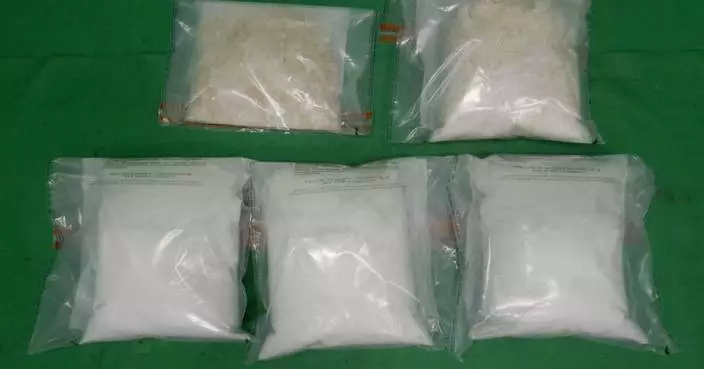Government pressing ahead with San Tin Technopole project
The Chief Executive in Council has approved the draft San Tin Technopole Outline Zoning Plan (OZP), the draft Mai Po and Fairview Park OZP and the draft Ngau Tam Mei OZP. The approval provides a statutory planning framework for taking forward the San Tin Technopole (except the Loop with approved statutory planning earlier) and the Sam Po Shue Wetland Conservation Park (SPS WCP).
A spokesman for the Development Bureau said today (September 20) that, with the completion of the statutory planning process, the Government will press ahead with the San Tin Technopole and related projects. Although the Environmental Impact Assessment (EIA) Report for San Tin Technopole is under the challenge of a judicial review, the project is underpinned by comprehensive and professional studies and extensive consultation in accordance with the laws and regulations. The project also carries strategic importance to innovation and technology (I&T) development, and there is a strong voice in the society for accelerating I&T development without further delay.
"The Government is striving to promote the development of the Northern Metropolis as a strategic growth area, pressing ahead with various land development, infrastructure and housing projects to address the needs of the society, people's livelihood and economic development. The Government will not, and should not, halt a project that will bring benefits to the society simply because an individual has applied for a judicial review. The Government team will tackle the challenges of the judicial review in full strength, while proceeding with the project cautiously and pragmatically, with a view to minimising the impact to the project progress arising from the judicial review being pursued by that individual," the spokesman said.
"The Government will seek funding approval for the first batch of site formation and infrastructure works for the San Tin Technopole from the Finance Committee of the Legislative Council towards the end of this year as scheduled, targeting to have the first batch of I&T sites formed in 2026. The availability of I&T land in a progressive and timely manner will create more space for local I&T start-ups to grow and better attract companies outside Hong Kong to settle in here. This will fuel up the momentum for development of the whole I&T sector, duly responding to the strategic support for Hong Kong to develop into an international I&T centre under the 14th Five-Year Plan," the spokesman added.
"Besides, the Government has been emphasising 'co-existence of development and conservation'. One of the goals of establishing the SPS WCP is to achieve no-net-loss in the ecological function and capacity arising from development. When we apply for the funding of works towards the end of this year, we will bundle it with the funding application for the design work of the SPS WCP Phase 1."
The spokesman stressed that the funding application for the first batch of works will not involve pond filling. As committed earlier, the Government will not start the pond filling works before commencement of works for the SPS WCP in 2026/27.
Other preparatory work includes formulation of the Planning and Design Brief (PDB), which will be submitted to the Town Planning Board for approval after consultation with relevant stakeholders. The PDB will provide more detailed development guidance for the relevant I&T sites.
The San Tin Technopole is the flagship project of the Northern Metropolis. Together with the Loop, there is a total area of about 600 hectares, half of which are I&T land. The San Tin Technopole will provide about 160 000 employment opportunities, about 50 000 flats, as well as comprehensive transport infrastructures and community facilities. It will become a modern new development area with industrial development, ecological conservation and a livable environment. During the two-month public engagement activities held last year, members of the public generally supported the development of the San Tin Technopole. The EIA Report has proposed various mitigation and compensatory measures to address the environmental impacts arising from the project, including the establishment of the SPS WCP. Not only will no-net-loss in the ecological function and capacity of the wetland concerned be achieved under the project, it will also enhance the ecological value of the existing wetland.
CHP reminds public on precautions against cold weather
The Centre for Health Protection (CHP) of the Department of Health (DH) today (December 22) reminded the public, particularly the elderly and people with chronic illnesses, to adopt appropriate measures to protect their health in view of the cold weather.
A spokesman for the CHP said that cold weather can easily trigger or exacerbate diseases, especially among the elderly and persons suffering from heart disease, respiratory illnesses or other chronic illnesses.
"Elderly people have less insulating fat beneath their skin to keep them warm, and their body temperature control mechanisms may be weaker. Their body may not be able to appropriately respond to thecold weather," the spokesman said.
Some senior persons may have decreased mobility, which can impair their ability to generate and conserve body heat. Chronic illnesses, such as hypertension, diabetes and endocrine disorders, may undermine the health of elderly people and lower their metabolic rate, subsequently causing their body to generate less heat. Persons with chronic illnesses, such as chronic respiratory illnesses or heart disease, are vulnerable to disease aggravation due to cold weather.
The CHP reminded the public, in particular the elderly and persons with chronic illnesses, to adopt the following preventive measures:
Take note of the weather forecast. Wear warm clothing, including hats, scarves, gloves and socks, accordingly;
Consume sufficient food to ensure adequate calorie intake;
Perform regular exercise to facilitate blood circulation and heat production;
Stay in a warm environment and avoid prolonged outdoor exposure;
Use heaters with care and maintain adequate indoor ventilation; and
Seek medical advice if feeling unwell.
In addition, the public should avoid alcoholic beverages.
"Drinking alcohol cannot keep you warm. Alcohol accelerates the loss of body heat through dilated blood vessels, resulting in chilling instead," the spokesman said.
"Parents should ensure that babies are sufficiently warm, but it is also important to keep babies relatively lightly clothed to avoid overheating them," the spokesman added.
Parents should observe the following safety measures when putting their children to bed:
Keep the room well ventilated and at a comfortable temperature;
Always place babies on their backs to sleep. Leave their heads, faces and arms uncovered during sleep;
Babies do not need pillows. Place babies on a firm and well-fitted mattress to sleep. Avoid soft objects, pillows and loose bedding;
Let babies sleep in a cot placed near their parents' bed; and
Maintain a smoke-free environment.
In addition, many respiratory pathogens, including influenza and SARS-CoV-2, may have increasing activity and community transmission during winter. Seasonal influenza vaccination is recommended for all persons aged 6 months or above, except those with known contraindications. Persons at higher risk of getting influenza and its complications, including the elderly and children, should receive seasonal influenza vaccinations early. Please see details of the vaccination schemes on theCHP's website.
A person who gets influenza and COVID-19 at the same time may be more seriously ill and would have a higher risk of death. It is important for elderly persons, especially those residing in residential care homes, to receive both a seasonal influenza vaccination and a COVID-19 vaccination. They should also receive an additional booster against COVID-19 according to recommendations as soon as possible. The public should also maintain good personal and environmental hygiene against respiratory illnesses and note the following:
Surgical masks can prevent transmission of respiratory viruses from ill persons. It is essential for persons who are symptomatic (even if having mild symptoms) to wear a surgical mask;
Wear a surgical mask when taking public transport or staying in crowded places. It is important to wear a mask properly, including performing hand hygiene before wearing and after removing a mask;
Avoid touching one's eyes, mouth and nose;
Wash hands with liquid soap and water properly whenever possibly contaminated;
When hands are not visibly soiled, clean them with 70 to 80 per cent alcohol-based handrub;
Cover the mouth and nose with tissue paper when sneezing or coughing. Dispose of soiled tissue paper properly into a lidded rubbish bin and wash hands thoroughly afterwards;
Maintain good indoor ventilation;
When having respiratory symptoms, wear a surgical mask, refrain from work or attending classes at school, avoid going to crowded places and seek medical advice promptly; and
Maintain a balanced diet, exercise regularly, take adequate rest, do not smoke and avoid overstress.
Food-borne diseases, particularly those linked to hotpot cuisine, are also common in cold weather. The following preventive measures should be taken:
Wash hands before handling and consuming food;
Do not patronise unlicensed vendors or those with poor hygienic standards while selecting food;
Wash and cook all food thoroughly;
Vegetables should be washed thoroughly in clean running water before cooking and consumption. When appropriate, scrub vegetables with hard surfaces with a clean brush to remove dirt and substances, including pesticide residues and contaminants, from surfaces and crevices;
Shrimps should be fully cooked until the shells turn red and the flesh turns white and opaque;
For shellfish such as scallops and geoduck, scrub the shells thoroughly and remove internal organs;
Do not eat any undercooked freshwater aquatic products. To ensure that the food is thoroughly cooked, the centre of the food should reach a temperature of at least 75 degrees Celsius so as to destroy pathogen;
Most hotpot ingredients should be stored in a refrigerator at 4 degrees C or below, while frozen food should be stored in a freezer at -18 degrees C or below;
Never use raw eggs as a dipping sauce for hotpot; and
Use different sets of chopsticks to handle raw and cooked food to avoid cross-contamination.
In addition, when using fuel-burning appliances, especially in indoor areas, the public should ensure adequate ventilation to avoid harmful exposure to carbon monoxide (CO) and prevent CO poisoning.
For more health information, the public may call the DH's Health Education Infoline (2833 0111) or visit theCHP's websiteandFacebook Fanpage.
The public may also call Dial-a-Weather (1878 200) or visit thewebsite of the Hong Kong Observatoryfor the latest weather information and forecasts, or itspage on Weather Information for Senior Citizens.








